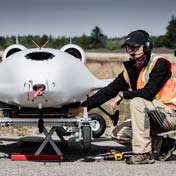Doctoral candidate presents in Ottawa on concussions
- Vimala Jeevanandam
A UVic chemist is in Ottawa today to talk to parliamentarians and senior government officials about her innovative approach to early concussion diagnosis.
Doctoral candidate Armita Dash is one of three early career researchers chosen to be part of a Universities Canada delegation. The trip is part of an effort by Universities Canada to emphasize the importance of funding fundamental science by providing examples of research that matter to Canadians and people around the world.
Dash's research is one such example. It provides an early detection method of diagnosing concussion or traumatic brain injury through the use of nanotechnology.
While rates of traumatic head injury continue to rise throughout North America, particularly for children and young adults, effective diagnosis of concussions has remained elusive.
Concussion patients don't have consistent symptoms, and the injury is often invisible on standard brain scans. This can lead to misdiagnosis or underdiagnoses.
—Armita Dash, doctoral candidate
Yet correct diagnosis can be a matter of life-and-death when it comes to concussion. If a person receives another brain injury before recovering—not uncommon if the person plays physical-contact sports—the result can be permanent disability or even death.
Dash’s system of diagnosis uses a nanoparticle-based marker that she designed that’s permeable to the brain’s membranes, and targets the protein known as “tau” in live brain cells. In people suffering from concussion or mild traumatic brain injury, tau is abnormally deposited in high amounts throughout their brain, killing healthy brain cells.
Dash’s marker allows the effects of a concussion to be more easily seen in a brain scan.
While in Ottawa, Dash will be on a panel presenting on the details and impact of her research to select parliamentarians and senior government officials. She’ll discuss the potential of this innovation to improve patient care and advance related research, as well as the importance that funding has made to her work.
Fortunately, Dash is no stranger to public speaking. In fact, she’s the first UVic student to make it to the nationals of the 3-Minute Thesis (3MT) challenge, a Canada-wide competition that challenges graduate students to present the complexities of their research in an engaging and accessible way.
“3MT gave me the opportunity to learn how to effectively and concisely explain my research to an academic audience,” says Dash. “Being part of this delegation is an exceptional opportunity to use that skill to help persuade the federal government of the vital importance of investing in university research like mine.”
Photos
In this story
Keywords: graduate research, research, chemistry, brain, concussion, student life, Ottawa
People: Armita Dash





